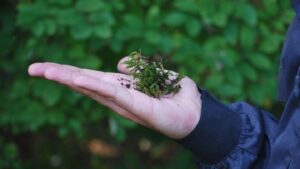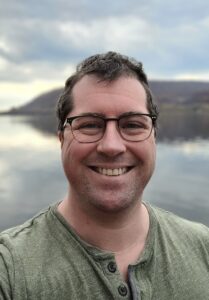Using Data and Science to Paint a Picture of the World

Beck Wehrle, Ph.D. , was in fourth grade when his teacher polled the members of his class, asking them what they wanted to be when they grew up. The son of two visual artists, Wehrle responded quickly and definitely: “A Ph.D.” Today he acknowledges that, at the age of 9, he was not entirely sure what that meant. However, he was certain that he loved science and nature (lizards in particular) and that he wanted to spend his life asking thoughtful questions and studying the world around him.
, was in fourth grade when his teacher polled the members of his class, asking them what they wanted to be when they grew up. The son of two visual artists, Wehrle responded quickly and definitely: “A Ph.D.” Today he acknowledges that, at the age of 9, he was not entirely sure what that meant. However, he was certain that he loved science and nature (lizards in particular) and that he wanted to spend his life asking thoughtful questions and studying the world around him.
Today Wehrle is an assistant professor in the Department of Biological and Environmental Sciences at Le Moyne, where he teaches courses in anatomy and physiology. Like his parents, he uses his work to describe the world. However, instead of utilizing shapes and colors, he uses data and the scientific method. Wehrle’s area of specialty is herpetology, the study of reptiles and amphibians. He employs physiology, behavior, ecology and more to help his students understand various organisms in their natural context. Put simply, he enjoys “watching animals and what they do, figuring out how they work, and imagining how it is that they exist in the world and how everything is related.”
Wehrle’s philosophy of teaching is inclusive and egalitarian. He makes space for his students in each of his classes. Yes, he delivers traditional lectures traditional lectures on the structure and function of the human body, but he also ensures that there is ample time for conversation. What’s more, he is careful to check in with his students in order to make sure that they are engaged. It is important for him to avoid “traditional classroom hierarchy,” and instead to build a community centered on curiosity and inquiry. He wants his students to be able to do more than simply memorize a particular set of facts; he wants them to learn to value learning for its own sake and to grow as thinkers. For him, that is the most valuable tool that they can take away from their time at Le Moyne.
I love working with undergraduates. They ask so many fresh questions, and it’s wonderful getting to interact with people when they’re building their confidence in science.
A native of Richmond, Calif, Wehrle earned a bachelor’s degree from the University of California, Davis, a master’s degree from California State University Northridge, and a doctorate from the University of California, Irvine, all in biology.
Pursuing a biology degree at Le Moyne, you’ll investigate living beings and ecosystems large and small, conduct scientific research and find solutions for challenges that threaten our well-being and the future of all species.
Home to unique opportunities, the Heights will connect you with friends and professors beyond the classroom walls to inspire you to think about what's possible.


